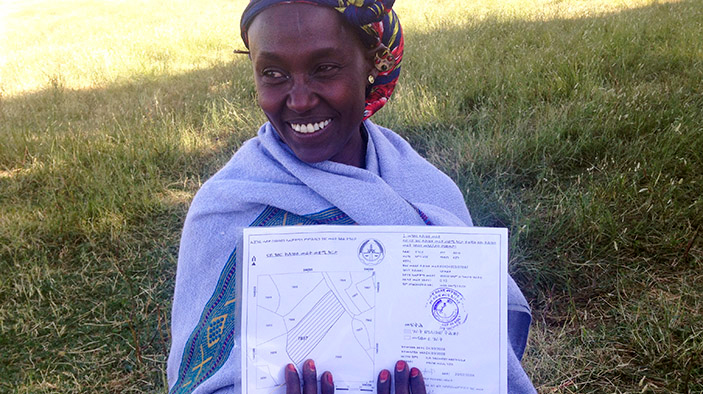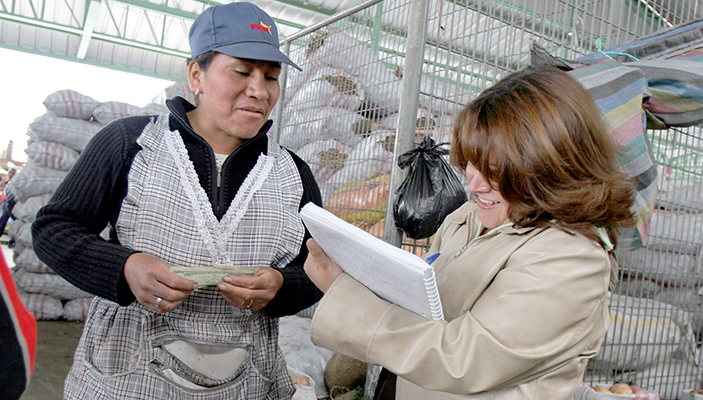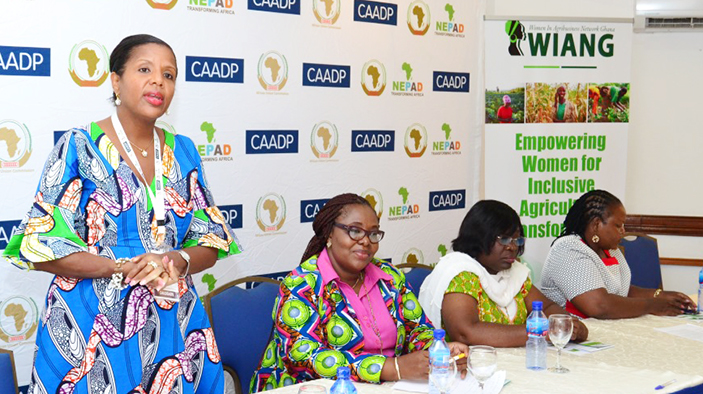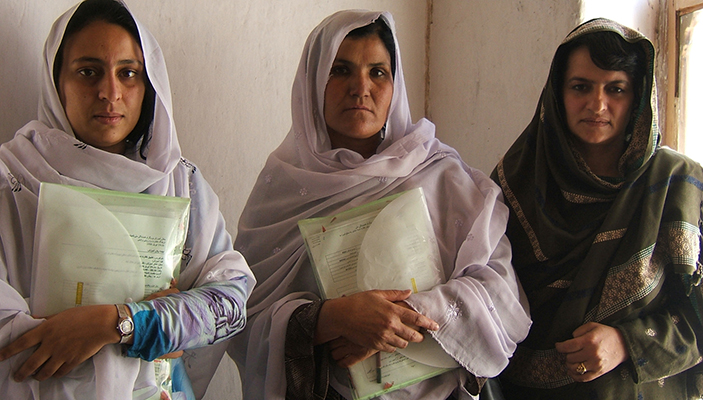DEVELOPMENTS
We Need More Women on the Frontlines of the War on Hunger
Jan 3, 2017
In developing countries, something is missing in the war on hunger: an equal voice for women.
Women produce more than half of the world’s food, according to the Food and Agriculture Organization (FAO), and are often responsible for selling, buying, preparing, and storing it. But women are less likely to lead agricultural assistance, make policy, or have access to agricultural inputs and technologies, extension services, credit, and markets. This disparity contributes to lower household incomes and chronic malnutrition for children; in government, it contributes to gender-ignorant policies, or leads to gender-sensitive policies being ignored.
Until women are full partners in the war on hunger, crucial policy instruments such as the 2016 U.S. Global Food Security Act will not achieve their full potential. Here are five things we can do right now to increase women’s contributions to the war on hunger.

##1. Strengthen Women’s Land Rights
When women hold secure property rights and transparent legal ownership, it enables them to invest in their land, gain access to extension services, and strengthen their position in agriculture. But in both policy and practice, women face hurdles to land rights, with laws or local norms limiting their authority. Assisting women in developing countries to establish land tenure can require addressing areas such as communal/customary and statutory systems, access to credit, the role of assets and collateral, decision-making authority, and cultural practices.
Funded by the U.K. Department for International Development (DFID), the Rwanda Land Tenure Regularisation program registered more than 10 million land parcels, with 92 percent of registrations including the name of a woman. The U.S. Agency for International Development (USAID) Feed the Future Tanzania Land Tenure Assistance program has begun a similar initiative; more than half of the parcels mapped and registered so far are for women owners and co-owners.
In Afghanistan, the law allows women to inherit and own land, but in practice the complex legal framework is not widely understood or honored by local shuras (community councils frequently dominated by men). The USAID Regional Agricultural Development Program—East (RADP-East) is working with shuras, religious leaders, and women’s groups to raise awareness of women’s land rights and overcome cultural obstacles.
To the north, the USAID Regional Agricultural Development Program—North focuses on home environments where women have a measure of say and protection. By establishing vegetable gardens in their yards, thousands of Afghan women in four northern provinces have improved their families’ nutrition and food security. Both RADP programs, which are implemented by DAI, are advocating for a land tenure legal framework that all Afghans can access and hold to account.

2. Increase Access to Services, Technologies, and Inputs
The phrase “a woman’s work is never done” too often applies in developing countries where women are responsible for farming as well as for gathering wood and water, preparing meals, and caring for children. The FAO estimates that women farmers could increase yields by 20 to 30 percent if they had the same access as men to land, financing, technology, and training. These assets would reduce women’s workloads, save them time, and improve their families’ quality of life. Under Feed the Future—Malawi Integrating Nutrition in Value Chains (INVC), implemented by DAI, women joined farmer groups to learn new skills and gain access to higher-quality seed, fertilizer, and pesticide, as well as extension services.
In some countries, women are excluded from—or not invited to—field and classroom training funded by donors. Women thus miss out on technical information, high-quality inputs, opportunities for financing, and research funding. For a rural woman burdened with chores, finding basic assistance can be challenging but not impossible. In northern Mozambique, a DAI-led project helped local women create more than 100 community savings groups; in turn, women have used their group savings to attract sellers of high-quality, certified seed, and fertilizer who might not otherwise have visited these remote villages. The project, funded by the Swiss Agency for Development and Cooperation, is scheduled to survey beneficiaries in March to measure changes to local eating habits and food security.
Where men object to wives and daughters being trained by a male, women trainers must play a key role. In Afghanistan, DAI’s direct training and technical services accommodate women’s mobility, schedules, and childcare needs. Our extension materials depict male and female farmers equally and use gender-sensitive, picture-based guidelines to assist illiterate farmers.
3. Increase Access to Financial Services
Women need working capital to grow their livelihoods or small businesses, and even though they have proven adept at managing money, women are often denied access to finance. Sometimes it requires creative thinking to connect women farmers to capital.
USAID’s Afghanistan Agricultural Credit Enhancement Program, featured in the video above, has lent more than $1.6 million to women-owned enterprises through Zahra Islamic Finance, a sharia-compliant program developed by DAI and vetted by an Afghan advisory board.
Women in cities also benefit from food-related financing. Since 2013, DFID’s Private Enterprise Programme Ethiopia, implemented by DAI, has assisted the Women’s Entrepreneurship Development Project in facilitating loans through partner financial institutions of more than ETB 1 billion (US$44.7 million) to 4,480 female borrowers. Eighty-two percent of the loans were provided to the trade and service sectors, including to female restaurateurs, bakers, grocers, and food processors.

4. Promote Women’s Agricultural Leadership
In countries such as Ghana, many rural women play a critical role in food production, processing, and marketing but have limited access to land, inputs, finance, extension services, technology, and market information. The Women in Agriculture Ghana Network is building a community of women “agripreneurs” to accelerate and enhance sustainable inclusive agricultural growth, transformation, and food security. This national platform promotes women-to-girl mentorships in agriculture leadership and public policy advocacy and empowers women farmers through training. This is but one initiative of the Africa Lead project, which was launched by USAID in 2010 to build agricultural leadership capacity across the continent.
The original Africa Lead program (2010–2013) trained or collaborated with 1,600 emerging agricultural leaders from 29 countries, achieving 30 percent participation by women overall. Also implemented by DAI, Africa Lead II, which runs through 2018, aims to boost women’s participation to 35 percent across all activities.
The DFID Arab Women’s Enterprise Fund provides another example. Launched in 2015, this five-year program will promote women’s business leadership in Egypt, Jordan, and Palestine. We will soon begin awarding grants to address market failures and obstacles to gender inclusion in sectors such as professional recruitment, livestock veterinary care, and women’s access to market systems.

5. Integrate More Women Into Planning and M&E
Food security programming must evolve beyond “tick-box” thinking when it comes to “gender.” This process starts by addressing the constraints, roles, and opportunities for women locally and nationally. By hiring women as extension staff, technical staff, and in key management positions, we can chip away at gender disparities. Equal training and mentoring that includes both women and men can lead to new, inclusive alliances and partnerships.
At DAI, women’s empowerment is a core responsibility. Team leaders are accountable for integrating gender equity in the planning, implementing, monitoring, and evaluating of food security projects. Start-up activities use gender integration plans to ensure women’s needs and participation are fully included and considered; as projects mature, they report sex-disaggregated data that document the extent to which women and marginalized individuals are engaged in activities, decision making, and leadership.
This practice manifests itself in projects such as RADP-East, where staff ensure that the Afghan government’s extension services and support includes women-specific outreach and extension, and leadership and business training. We select value chains where women have multiple avenues for making positive economic impacts—for example, the apricot sector enables women to grow saplings for other farmers, farm trees, or produce or sell the fruit, dried fruit, and jams.
Women are intrinsic to food security. In developing countries, empowering women to lead agriculture and nutrition programs, make policy, or simply enjoy equal access to land, training, and services will improve global efforts to eradicate hunger.